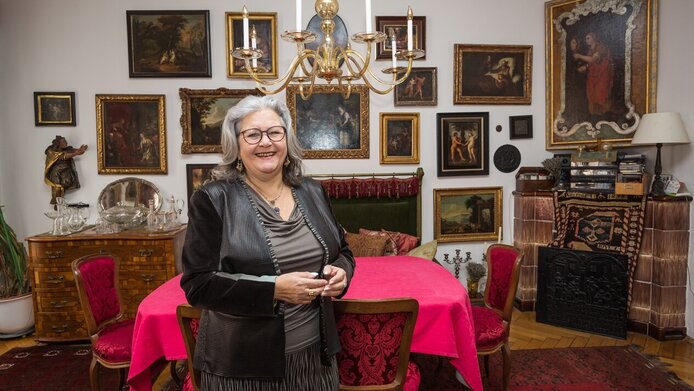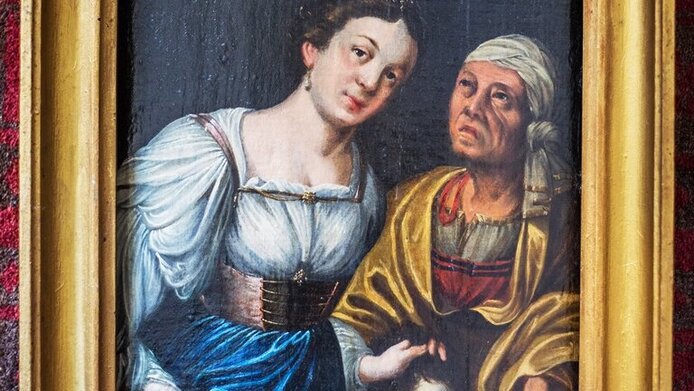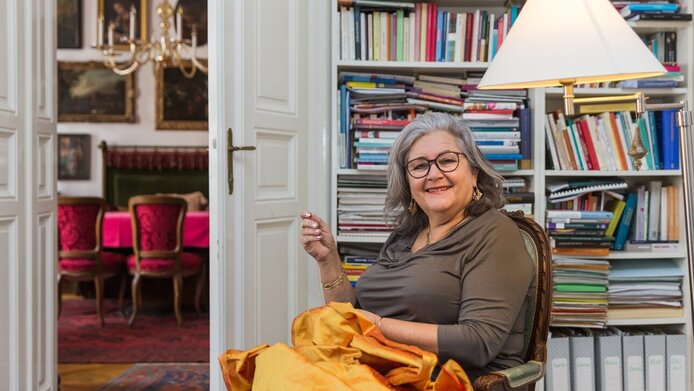Through different lenses

December 2019, Schauspielhaus Graz. For five hours, about 30 women – politicians, scientists and actresses – read from texts designed to be “programmatic for the equal treatment of all genders”. The texts spanned a wide arc from the European Declaration of Human Rights, to thoughts from Simone de Beauvoir's feminist classic The Other Sex, to passages from the National Council debate on the lyrics of the Austrian national anthem, which were gender-adjusted in 2011. With this “Long Night of Gender Reading” the organizer and feminist theologian Irmtraud Fischer wanted to take a stance against the "right-wing shift in Europe, which involves attempts to reverse society’s efforts towards the equal treatment of all genders, or at least make them look ridiculous”.
25 years of “Women's and Gender Studies in Theology”
At the same time, the reading event marked the kick-off to an anniversary celebration of the University of Graz’s Faculty of Catholic Theology: 25 years ago, the focus programme “Women's and Gender Studies in Theology” was established here. The person to thank for that is Irmtraud Fischer, a Bible scholar at this university, who recognized an opportunity to act: on 22 May 1994, the Vatican published a declaration by then Pope John Paul II on the ordination of priests. “Women appeared in this text only as child-bearers and consecrated virgins,” is how Fischer sums it up. The document led to a discussion at the Faculty of Catholic Theology, in which some colleagues called for a press release. “But that was several weeks after the declaration and would therefore have been ridiculous,” Fischer recalls. Instead, she proposed to respond by promoting women. “Everyone present was glad that the press release was off the table,” reports Fischer and adds: “If I had prepared dozens of pages of text explaining exactly why we needed women's and gender studies, this would certainly not have been accepted.”
Religion and gender construction
The focus programme “Women's and Gender Studies in Theology”, which was established at the University of Graz as a result, is dedicated to various thematic areas. In addition to the question of what part religions play in the construction of gender roles, the programme explores the as yet unknown female part of Christian history. Aspects under study include the present-day teaching of religion with a view to the role of specific gender images in school lessons or in pastoral work in the parishes. This is a thoroughly interdisciplinary type of research, and one unique in Austria as part of a Faculty of Catholic Theology. Fischer considers this interdisciplinary element to be one of the most important tasks of theology: “Without interdisciplinary networking theology loses its social relevance.”
Focus on gender-sensitive exegesis
This is not the only ground-breaking achievement of this feminist theologian: not only was she the first woman in Austria to acquire professorial qualifications in Catholic theology, but also the first to do so on a feminist topic, and she is one of the few scholars in this field to conduct research from a feminist perspective. Fischer seeks to shift the focus in the Bible and in theology away from a purely androcentric perspective towards a gender-neutral interpretation. She herself calls it: “Looking at it through different lenses.”

Parental instead of patriarchal narratives
By looking through these other lenses Irmtraud Fischer had noticed that every second text among the so-called “Stories of the Patriarchs” was a woman’s text. “But in the churches only men's texts are read,” she points out a contradiction. She goes on to explain: “It is about the history of Bible interpretation, and there have always been women who read and interpreted the Bible.” With the title of her professorial thesis, published in 1994, Die Erzeltern Israels. Feministisch-theologische Studien zu Gen 12-36 she coined a new term (Erzeltern or arch-parents) and has had a lasting influence on theology that can be traced right up to today's textbooks and the official German version of the Catholic Bible: today German theology no longer speaks of “Stories of the Patriarchs” but of “stories of the arch-parents”.
“I never wanted to become like that”
But what was the route that led her to a male-dominated theology? It started out in an outright women's domain: after grammar school in Stainach, the girl from Bad Aussee (Styria) attended the Teacher Training Academy in Graz-Eggenberg – with the aim of becoming a primary school teacher. She was not so much following her personal inclinations as the career aspirations of her mother, who had been denied this training as a member of a family that had no links with the Nazi party. Already in the first two weeks of her training, during an internship in a primary school, Irmtraud Fischer realized that this profession was not for her: “The teacher there was a deterrent for me, I never wanted to become like that,” is how she remembers the pivotal experience. In order to have a secure livelihood, she nevertheless completed her training and extended her teaching qualification to include religious education.
“Too bad you're not a boy”
This made her want to study theology, a wish that her parents categorically rejected initially: “They thought that the hierarchical relationships in theology were not a good environment for a woman.” In order to convince their daughter, they even invited the church historian of the University of Graz, a native of Bad Aussee, to their home. “The first thing he said to me was: too bad you're not a boy, meaning that I was of no use as I couldn’t be a priest.” It would not have been Irmtraud Fischer – always ready to argue, courageous and self-confident – if she had let herself be deterred by that. That said, she admits that right up to writing her thesis she had – typically female – self-doubts about being qualified for research. “Up to that point I always used to say: if things go well,” she notes – and in addition there were no role models for her. “In the 1980s I was one of only two female assistants at the Faculty of Catholic Theology,” she reports.
Driven by challenge
The Old Testament scholar was driven to feminist theology by the challenges confronting female Catholic theologians. “As a layperson – and a woman to boot – you’re second class. If you are a male student of theology and unmarried, you’re a potential priest. Women are excluded from the ordained ministry, but every final decision in the Church depends on such ordination.” Even if a woman holds a high office in the Church, she can therefore be outvoted by an ordained man at any time.
A revelation
Fischer’s career path was marked by pioneers of feminist theology, above all the US-American Catholic biblical scholar Elisabeth Schüssler Fiorenza, who taught at Harvard University for a long time. Of her roughly 20 books, the best-known is In Memory of Her, published in 1983 and translated into more than ten languages. In the book, Schüssler Fiorenza combines the methods of historical textual critique with the theological aims of liberation theology in order to make women the subject of revelation. Fischer remembers her personal moment of revelation when reading the book: “That’s it! We have to interpret the Bible with the existing tools – with new hermeneutics. And with a new perspective.”
Stay close to the text
This was the impact under which she developed her professorial thesis on the “Arch-Parents of Israel”, which was met with great interest by one of the most influential and important scholars in her field: During her time as a visiting professor at the world's oldest Protestant faculty in Marburg, Germany, the theologian Otto Kaiser Fischer, then recently retired, asked to be allowed to read her paper, which she had just submitted. “He called after a week and said: if this is feminist exegesis, we need it! A septuagenarian understood the necessity – because our work is on the text and is not only concerned with making demands,” she explains. And this principle has stayed with Fischer to the present day: strictly keep to the text, but explore whether it can be understood in a different way.
A new role of women in the Bible
Since 2005, Irmtraud Fischer has been the coordinating editor of the series The Bible and Women. An Encyclopaedia of Exegesis and Cultural History, which is published in 21 volumes and four languages. To date, the German edition includes twelve volumes. This research project, which she describes as her “life's work”, focuses on female figures from the Bible, their reception in the tradition of scriptural interpretation, but also women who themselves have engaged in exegesis, as well as gender-relevant themes and their reception – also in the arts. “This is not about the role of women in the Bible, because it is accepted knowledge among biblical scholars that it was different from what traditional readings try to convey,” Fischer says and gives an example: “In the New Testament there was no office of priesthood, that is just a back-projection on our part. These offices developed much later, and therefore we cannot read the Bible as proof that Jesus did not ordain any women priests, because he did not ordain any priests at all, neither men nor women.”
Unique in the world: gender issues in the history of interpretation
“The Bible is well researched in this regard,” Fischer notes. “What is new, however, is the history of reception, which claims such things, and the longer the claim, the more deeply enrooted – especially with regard to women. Our project is the first and only one in the world to develop a continuous history of interpretation that focuses on women and the gender issue,” Fischer explains. It is her observation that, in the case of certain texts, the way they have been read over centuries is much more familiar to people than the text itself.
Eve the seductress?
Fischer cites “Adam and Eve” as a famous example: the story, which has already become a cultural code, is known to everybody. It is a tale of seduction with Eve as the classic seductress. “Mind you, this is not the Bible text itself, but the interpretation that has evolved over time. It is important to know how the tradition has grown historically, because at all times the Bible has also been interpreted by women, and interpreted differently at that.”
“That's oblivion by design”
More than 300 people from many different disciplines are working on the encyclopaedia, which will comprise a total of 21 volumes. Fischer is looking forward to further discoveries being made in the many archives that are still closed. The Italian historian Adriana Valerio, like Fischer a key editor of the series, was able to prove, for instance, that a nun wrote a commentary on the entire Bible in the mid-19th century, and she did so at a time when women in the Catholic world were forbidden to read the entire Bible without the guidance of a priest. The nun's commentary was published, but was subsequently forgotten. “This is a deliberate act of letting something fall into oblivion on the part of a patriarchal society, where men decide what continues as the official tradition", says the expert, and emphasizes that women have some responsibility in this process as well: “Women must be empowered to write texts themselves and to read publications by women as their own tradition, so that they are not forgotten.”
Sexuality not aimed at reproduction
Fischer is currently working on a book about sexuality in the Old Testament and once again refutes traditional norms: based on the text of the paradise story she argues that sexuality – in contrast to the traditional reading – is not only aimed at reproduction, but also relates to community life and the relationship between the sexes. “An issue of enormous importance to the gender question,” she says.
No normativity of heterosexuality
A further interpretation, which is of great social relevance, concerns the story of creation. The two poles “male and female” had long been used to underpin the normativity of heterosexuality. “But the entire text is geared to contrasting poles: heaven and earth, light and darkness, etc. Nonetheless one cannot claim that God did not create dusk and dawn. Male and female are therefore only at the outermost end of the poles, and all other forms of sexuality have of course also been created by God. Today one can no longer speak of the exclusive normativity of heterosexuality.“
Theology does not equal church
According to the scholar, the fact that the Church represents a different position is to be explained by its petrification: “With regard to these points the Church is still stuck in the 19th century.” Fischer is often interviewed on church issues, but she insists on the fact that theology as a science practised at universities is committed to freedom of research and not to church precepts. “Theology has a completely different level of thinking and considers other things to be important than those that are being discussed in the Church and what then reaches the general public through the filter of the media.”
Church in free fall
In 2019, the number of people leaving the Roman Catholic Church in Austria rose by almost 15 percent. In Carinthia, the figure even reached just under 64 percent, which is linked to the corruption case involving the former bishop Alois Schwarz. “The Church is in free fall by now,” is Fischer’s comment on these figures. She believes the main problem to be that it is concentrating too much on structures. “Priesthood was elevated to an ideology under Pope John Paul II. People have spiritual needs, but the Church is no longer able to meet them, even though it has a rich spiritual tradition. It would actually be a real opportunity for the Church.” Fischer also misses a “now” kind of message that would reach people: “The Bible gives us canonical texts that are complete in themselves, but the commentary on them cannot be flexible enough. They have something new to say to each generation. Canonicity consists precisely in adapting the meaning to the new generation, to a new epoch. Today, this must mean inculturation into western gender democracies. But I don’t see that happening.”

Intellectual flexibility
Fischer herself attributes the fact that she has made her way in this male domain to the following qualities: high standards, stamina and intellectual flexibility. It is precisely this flexibility that she values most in her students: “I want to teach them to think. Because if you want to discover something new, you can’t follow well-trodden paths, you must be able to think outside the box.”
Wardrobe as an evaluation tool
A measure for the tremendous writing output of the hard-working scholar is her wardrobe: she makes almost all of her own clothes – during breaks from writing. “During a break I sew two or three seams and then continue writing until the next break. It goes hand in glove,” is her description of the process. The 62-year-old scholar taught herself how to sew as a student, as she could not afford to buy the clothes she would have liked to wear at the time. However: the creative momentum comes and goes in both areas at the same time: “If I can't think of anything to write, I can't get anywhere with my sewing either,” she smiles. When listening to her speak about her plans and other projects, one can only advise her to provide for more closet space. There is one thing that this assertive researcher is sure about: “If the pressure from women for equal treatment, equal rights and equal pay wanes, things will immediately go backwards again.” This is one of the reasons why there will be more “Long Nights of Gender Reading”.
Personal details
The biblical scholar Irmtraud Fischer is Professor of Old Testament Studies at the Faculty of Catholic Theology, University of Graz, since 2004. She was the first woman to acquire a professorial qualification in Catholic theology in Austria – and the first to do so on a feminist topic. From 2007 to 2011 she was Vice-Rector for Research and Continuing Education. She has been a member of the doctoral programme “Interdisciplinary Gender Studies” at the University of Graz since 2009 and its spokesperson since 2015. In 2016 she was accepted into the “Gallery of Women Pioneers” of the City of Graz; since 2005 Fischer has been the coordinating editor of the publication series An Encyclopaedia of Exegesis and Cultural History, which comprises 21 volumes in 4 languages. In German, 12 volumes have been published so far: www.bibleandwomen.org
Among numerous other distinctions, Fischer received an honorary doctorate in history and cultural studies from the University of Giessen in 2017. She is deputy spokesperson of the International Graduate School “Resonant Self-World Relations” at the University of Graz in collaboration with the Max-Weber-Kolleg in Erfurt, Germany. A special concern of Fischer’s is “science to public” and “science to professional”. In this context she regularly gives further training courses for teachers of religion, organized the "Long Night of Gender Reading" at the Graz Schauspielhaus in 2019 and in 2008 founded the so-called “Aussee Talks”, which took place for the twelfth time at the end of June 2020.





